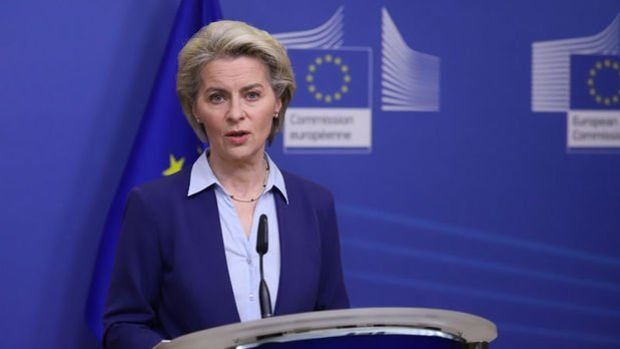EU: We should reduce risks instead of decoupling from China
European Union (EU) Commission President Ursula von der Leyen said that the EU, instead of diverging in its relations with China, needs to reduce risks by clearly identifying opportunities and challenges and that it does not want to sever economic, social, political and scientific ties. Von der Leyen spoke at a session held at the European Parliament (EP) General Assembly on the EU’s development of a coherent strategy in relations with China. Referring to her impressions from her simultaneous visit to China with French President Emmanuel Macron in early April, von der Leyen said she admired the country’s history, culture and society. Von der Leyen explained that the visit was useful for conveying Brussels’ message to Beijing and should be seen as an essential part of efforts to reduce misunderstandings and reduce risk through diplomacy, saying, “I stated in Beijing that we do not want to sever our economic, social, political and scientific ties.” EU Commission President von der Leyen pointed out that instead of “diverging” with China, there is a need to work to de-risk some important and sensitive aspects of relations. Political tensions Underlining that the starting point for this will be to clearly define the risks and opportunities in relations with China, von der Leyen said that China’s overall strategic stance has hardened in recent years, with examples of this seen in the South and East China Seas and on the Indian border. Stating that China’s stance in these regions directly impacts the legitimate interests of the EU’s partners, von der Leyen explained the EU’s stance on Taiwan as follows: “The EU has had a one-China policy for a long time. We have consistently called for peace and stability in the Taiwan Strait. We strongly oppose any unilateral change of the status quo, especially through the use of force.” Human rights violations The EU Commission President said, “We should never shy away from speaking out about the deeply worrying and grave human rights violations in Xinjiang (Uyghur Autonomous Region), precisely as China is escalating its military stance.” Stating that China was implementing certain tactics, von der Leyen said, "I would like to express my solidarity with the MEPs who were unjustly sanctioned by the Chinese Communist Party simply because they spoke out about human rights violations. China is moving from an era of 'reform and opening up' to an era of 'security and control. '" Economic relations Stating that China is an active economic power and a global player today and that it has become a pioneer in many of the advanced technologies that will shape the coming years, von der Leyen said, "This international and economic situation and our own interests make it even more important for Europe to manage its relations with China." Pointing out that there are risks and opportunities in relations with China, von der Leyen said, "For Europe, decoupling from China is not a valid, preferred or practical option." Stating that "China has increased its economic and commercial pressure policy over the last year," von der Leyen said that the country has moved away from the logic of open markets and free trade and prioritized security. von der Leyen made the assessment that, "China is clearly pursuing a policy of decreasing its dependence on the world while increasing the world's dependence on itself." Pointing out that China has applied this in areas such as critical raw materials, renewable energy, artificial intelligence, quantum computing and biotechnology, von der Leyen explained that an approach suitable for economic and security challenges for the country should be developed. Von der Leyen said, “China is a vital trading partner with whom we have strong ties in many areas. Our daily trade with China amounts to 2.3 billion euros. Most of our trade continues to be mutually beneficial. However, there is an urgent need to rebalance our relationship based on transparency, predictability and reciprocity.” Explaining that they want to compete with China on equal terms, von der Leyen pointed out that China should make its support transparent and respect intellectual property rights. Reminding that there are some areas where trade and investments pose a risk to their economic and national security, von der Leyen stated that China has clearly combined its military and commercial sectors. Stating that, “The center of our future China strategy should be to reduce economic risk,” von der Leyen emphasized the importance of Europe increasing its own resilience and independence. Von der Leyen emphasized the importance of Europe being resilient and independent in energy, health, medicine, food security and defense capabilities. Stating that the EU should be more courageous in using its existing commercial defense tools, von der Leyen explained that in some critical sectors, European companies should prevent their capital, expertise and knowledge from being used to strengthen the military and intelligence capabilities of their systemic rivals. Von der Leyen stated that they will prepare a new economic security strategy on this issue in the coming months and emphasized the importance of EU countries acting together without division on the China strategy.


